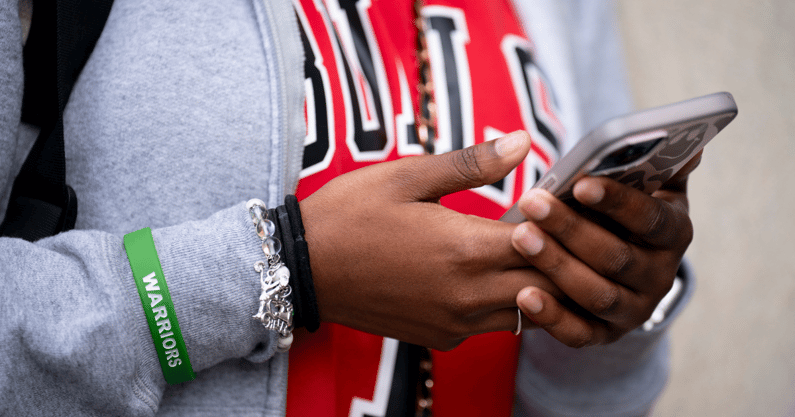Mitch Barnhart’s goal is to put rings on fingers and diplomas in hands. Around the state of Kentucky, schools took cell phones out of students’ hands and replaced them with library books.
House Bill 208 went into effect this summer, requiring phones to be kept off and out of sight during a school day. Kentucky is one of 35 states that restricts or bans cell phone usage during school. Discretion was left open-ended for school districts to determine how to enforce the new policy. In Jefferson County Public Schools (JCPS), some tell the students to keep it in their lockers during the day, while other schools purchased lock pouches, like the kinds used to comedy shows, to prevent students from using their devices.
Students weren’t necessarily eager to embrace the changes. Some parents worried that it could take away a form of communication with their child in case of an emergency. Schools reassured that centralized communication from the school would suffice. Still, there was some anxiety around the question, “Would this work?”
It was answered almost immediately, “Yes.”
Students put down their phones and picked up books. Within the first 16 days of school at PRP High School, students checked out 1,000 books. That’s nearly half of the 2,100 books that the student body checked out during the entire 2024-25 school year. At Butler, 40% of the student body checked out a book by Labor Day, doubling last year’s total.
Those eye-opening numbers from JCPS caught The Washington Post’s attention. A reporter went to Ballard High School, where students checked out 67% more books from August 2024 to August 2025. The school’s librarian, Stephanie Conrad, said she felt disconnected from students since the pandemic. The cell phone ban has made everyone more engaged.
“It’s been fun for me to see that come back around and just to have wonderful conversations with kids about books,” she said.
Social media platforms beg for online engagement. High schoolers are now receiving real-life engagement.
Get the Daily On3 Newsletter in your inbox every morning
By clicking “Subscribe to Newsletter”, I agree to On3’s Privacy Notice, Terms, and use of my personal information described therein.
WDRB went to Waggener High School, where students are bringing back recess to their free period. Instead of sitting in the corner scrolling, students are playing yard games and making new friends. Not only are they more engaged during the school day, but they’re spending less time on their phones once they get home.
“I wouldn’t have known these guys if it wasn’t for the no phone; I’d probably be somewhere out there on my phone,” said one student, Daniel Owandji. “Since I’m not on my phone all the time at school, I feel like I don’t need it. At home, I’ll actually be doing work. Last year I said, ‘I’ll do it at home’ and not actually do it. Now, I’m doing (homework) at home.”
Waggener principal Sarah Hitchings said discipline issues are also down at the school. Admittedly, this writer’s wife is a JCPS high school teacher, one who strongly supported the cell phone ban. Even though there was plenty of anxiety from students around the change, and some initial rule-breakers who didn’t want to put away their phones, the change has drastically improved day-to-day life at the school.
For anyone who’s ever dieted, you know that making an initial change is easy. Sustaining that new habit is a challenge. So far, this new policy is working wonders. Maintaining momentum is the key to successfully creating more socially active and engaged young adults across Kentucky.
